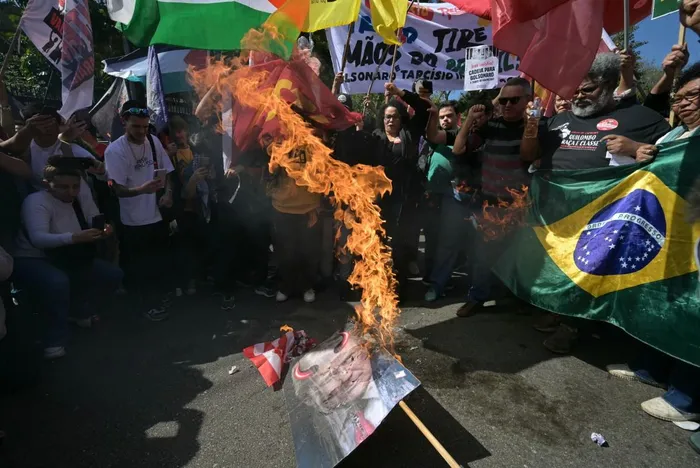Trump’s Economic Coercion Failing to Intimidate BRICS Countries

Demonstrators burn a US flag and a picture of US President Donald Trump during a protest in defence of national sovereignty following the US government trade taxes and sanctions on Brazil, near the US consulate, in Sao Paulo, Brazil, on August 1, 2025.
Image: AFP
Kanwal Sibal
US President Trump has rattled Washington's ties with New Delhi to an unexpected degree. Countries, including India, were prepared for rough diplomatic weather after Trump won his second term, but did not anticipate the kind of onslaught he has unleashed on the global system and diplomatic norms.
Trump’s latest attack on India and the BRICS countries explains this underlying dynamic. The BRICS aspire to play a greater political, economic and financial role in global affairs. This aspiration is based on shifts of economic and concomitant political and financial power towards the so-called emerging powers or middle-income countries.
BRICS countries have already begun to use their national currencies in trading with each other as much as possible. The use of draconian financial sanctions on Russia by the West has accelerated this process.
Today, almost all trade operations between Russia and China are conducted in rubles and yuan. India, too, is encouraging the use of its national currency in payment transactions with select countries. A significant portion of the trade between India and Russia is now settled using a rupee-ruble mechanism.
Washington cannot use secondary sanctions to prevent countries, including India, from using the US dollar to trade with Russia and then oppose de-dollarisation if these countries are compelled to use alternative payment mechanisms. If the US continues to weaponise the dollar, it will inevitably lead to the very “de-dollarisation” that Trump is concerned about.
India has officially disowned any de-dollarisation agenda, not the least because the US is its biggest trade partner in goods and services. India seeks more investments and technology transfers from the US. In many ways, New Delhi’s ties with Washington are the most important for achieving its growth and developmental goals. But that does not preclude India from establishing other partnerships to reduce over-dependence on one country, balance its external relations and hedge against the excesses of US foreign policy.
Trump has exacerbated the disruptions caused by Washington’s frequent use of sanctions as a political weapon by also weaponising tariffs. He is convinced that by imposing arbitrarily determined tariffs on imports from other countries, he will compel them to enter into negotiations with the US to obtain relief by lowering their high tariffs on American products. But India on Wednesday sent a clear message: it is determined to protect the interests of its businesses, farmers and people.
Trump’s use of tariffs as a lever, like in the case of Brazil, where he has cited President Lula’s treatment of his predecessor Bolsonaro as a reason for imposing 50% levies, is being closely monitored by the world’s governments.
Trump has repeatedly targeted BRICS since his return to the Oval Office. He had threatened the countries with tariffs if they continued to pledge to create a new common currency or support any alternative to the US dollar. Trump appeared to harbour the illusion that BRICS was ”dead” following his threats, which have now materialised into action.
In reality, the BRICS summit held in Brazil this July showed no visible signs of intimidation. On the contrary, such overt displays of American economic coercion may well drive more countries toward alliances that seek to challenge the dominance of any single global power.
The administration in Washington appears to lack realism in its assessment of global trends. Trump positions himself as a peacemaker and openly aspires to win a Nobel Peace Prize, while at the same time bombing Iran and assisting Israel in perpetuating the humanitarian crisis in Gaza.
Similarly, threatening China as a BRICS member with 100% tariffs so casually – along with talk of bombing Beijing if the People’s Republic were to invade Taiwan – makes little sense, especially given that an interim trade deal has already been reached and further negotiations are imminent. The US cannot reasonably claim that forums like BRICS have no right to determine their agenda in pursuit of their shared interests.
At the same time, the US has walked out of or subverted key international agreements and institutions. It has withdrawn from the Paris Climate Change agreement, the WHO, the UN Human Rights Commission and UNESCO.
Trump seems to believe that these organisations cannot function or survive without the presence of the US and its financial contributions. In reality, the US will lose its voice and its leadership in these international forums. The space it vacates will be filled by others, especially China. Beijing has already carved out enormous influence in the UN institutions, as it is now the second largest contributor to the UN.
With Washington also bullying Europe and thereby damaging Western solidarity, the US's absence from these organisations will have even less impact. The more the world learns to manage without the US in these international bodies, the more America’s international influence will erode. These US decisions will also accelerate the dispersal of influence at the global level, as other centres of influence develop.
* Kanwal Sibal is a retired Indian foreign secretary and a former Ambassador to Russia between 2004 and 2007. This article was originally published at https://www.rt.com/
** The views expressed do not necessarily reflect the views of IOL, Independent Media or The African.